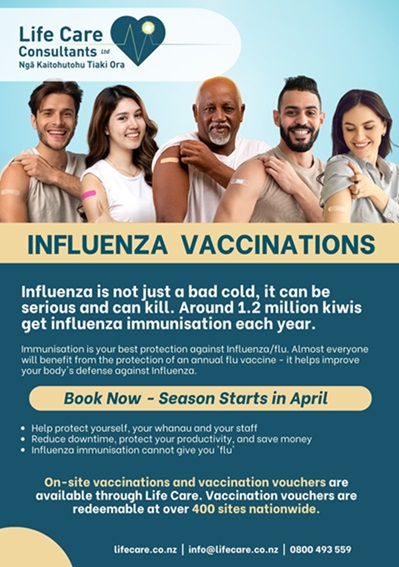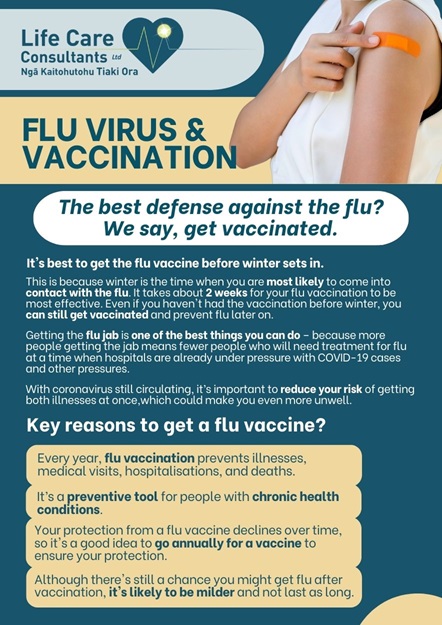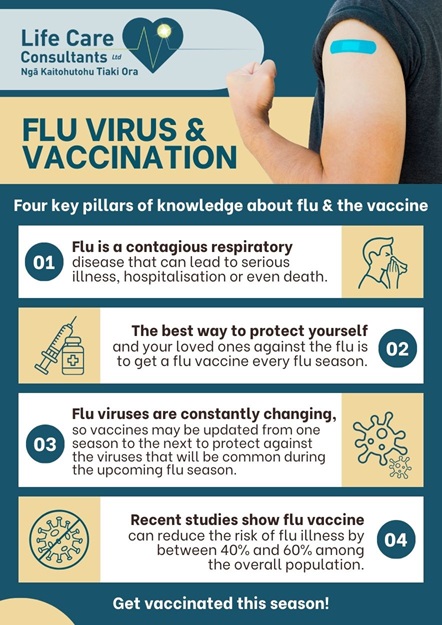Flu Vaccinations
Select the PDF brochure to download
Flu Virus & Vaccinations FAQs
What is flu (influenza)?
Influenza (flu) is a common viral illness. In New Zealand, most cases occur during the winter, from May to October.
How do you catch flu?
Flu spreads through someone talking, laughing, coughing or sneezing, then ingested by touching your mouth, nose or eyes after touching something the virus-containing droplets have recently landed on.
Do I need the flu shot if I have had the COVID-19 vaccine? Will the shots interfere with each other?
The flu and COVID-19 are different diseases so you need both vaccines to be protected from each one. A flu shot provides a specific ‘key’ that unlocks a strengthened immune response to protect against influenza. And a COVID-19 vaccine provides a different ‘key’ that also unlocks a strengthened immune response to protect against COVID-19. There is no master key that works for all viruses, so getting vaccinated against both infectious diseases will help keep you healthy. Getting the flu shot will not counteract the effects of the COVID-19 vaccine.
Do I have to wait between getting the flu shot and the Covid-19 vaccine?
No, they can be given on the same day. Studies show that co-administration of COVID-19 and influenza vaccines is safe and produces a good immune response.
What’s in the 2024 flu vaccine?
This season’s vaccine is Afluria Quad.
Included in it is egg-based quadrivalent vaccine.
- A/Victoria/4897/2022 (H1N1)pdm09-like virus (A/Victoria/4897/2022 IVR-238): 15 micrograms HA* per dose
- A/Thailand/8/2022 (H3N2)-like virus (A/Thailand/8/2022 IVR-237): 15 micrograms HA* per dose
- B/Austria/1359417/2021-like virus (B/Austria/1359417/2021 BVR-26): 15 micrograms HA* per dose
- B/Phuket/3073/2013-like virus (B/Phuket/3073/2013 BVR-1B): 15 micrograms HA* per dose *HA – hemagglutinin
This does not contain an adjuvant, thus reducing the risk of a reaction. Adjuvant-free vaccination is the safer vaccine of choice in a non-clinical setting.
How long does it take to work?
It takes up to 2 weeks after vaccination for the body to start protecting against flu.
What are the symptoms of flu?
Influenza is not just a ‘bad cold’. Although some of the symptoms are the same, influenza is usually much more severe, often has a sudden onset and can have much more serious consequences.
Flu may include any or all of the following symptoms:
- Fever
- Muscle or body aches
- Headache
- Dry cough
- Sore throat
- Runny nose
- Vomiting and diarrhoea
- Lack of energy, – may be severe and last for two or more weeks
Where can I find more information about flu and the influenza vaccination?
Where can I find more information about flu and the influenza vaccination?
The following NZ websites have reliable and credible information:
How long will the flu shot last?
The effectiveness of the flu vaccine declines over time. However, it provides protection for up to 6 months on average.




